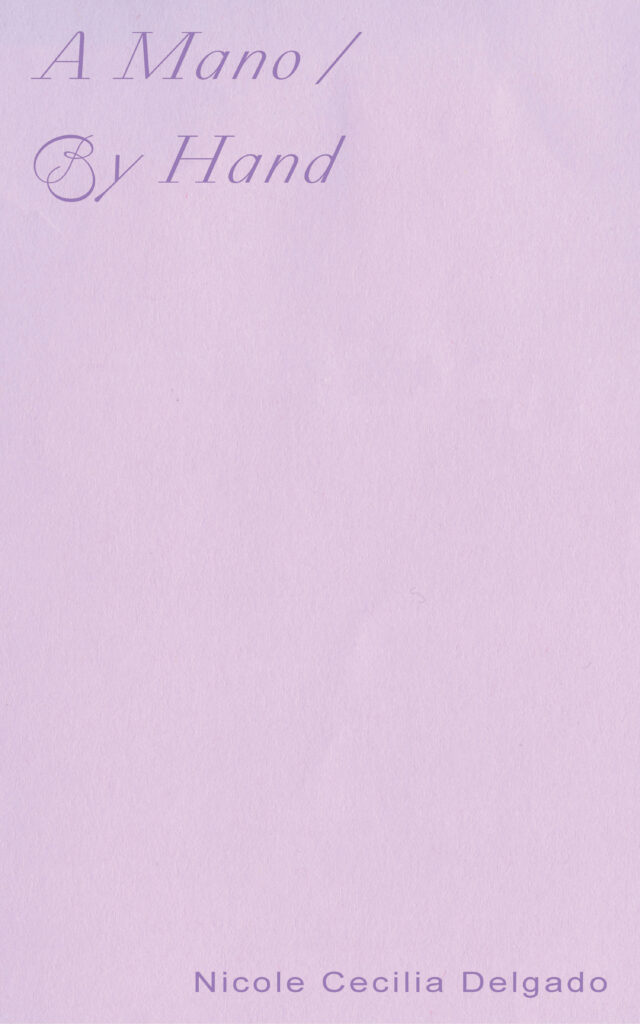It is impossible to imagine contemporary Puerto Rican poetry without Nicole Cecilia Delgado … Nicole writes, 'poetry is the project's basic unit' and I know that by poetry she means more than just the text, she means all of us working together to forge a different world.
Raquel Salas Rivera

A Mano / By Hand
Nicole Cecilia Delgado
Translated by Carina del Valle Schorske
December 2020
Starting with Ulises Carrión’s claim that “there is no art and life, but rather only life,” Nicole Delgado’s essay wonders how to live a life of poetry, and explores several paths of artistic existence. As she moves through her life in New York, Mexico, and Puerto Rico, a variety of communities, economies, books, book fairs, publishers, makers, artists, and poets people her scenes and life. Through these travels and engagements, Delgado proposes that poetry is the basic unit of the project, the project of living a life in communities, with dignity and joy.
This pamphlet is part of UDP’s 2020 Pamphlet Series: twenty commissioned essays on collective work, translation, performance, pedagogy, poetics, and small press publishing. The pamphlets are available for individual purchase and as a subscription. Each offers a different approach to the pamphlet as a form of working in the present, an engagement at once sustained and ephemeral. To view a full list of pamphlets, click here.
About the Author
Nicole Cecilia Delgado is a poet, translator, and book artist. Her work has been translated into English, Catalan, Polish, German, Galician, and Portuguese. With the poet Amanda Hernández, she currently directs and develops La Impresora, a poetry press and risograph print shop dedicated to small-scale editorial work and allocating resources to support local independent publishing, and from which they also organize the Independent and Alternative Book Fair in Puerto Rico (FLIA PR).
Praise
It is impossible to imagine contemporary Puerto Rican poetry without Nicole Cecilia Delgado. Her projects, collaborations, and energy have allowed emerging poets to see themselves as part of a larger network, and although she is only one of many creators, her presence has undeniably expanded what we can collectively imagine. I'm grateful we now have this record of the work she has done in community and of how she came to that work. This text is a tribute to those who, like her, have made poetry possible. Nicole writes, 'poetry is the project's basic unit' and I know that by poetry she means more than just the text, she means all of us working together to forge a different world.
Raquel Salas Rivera
For Nicole, the process of creation, research, and assemblage of the work makes up the poem itself.
Mara Pastor
I was eager to see Nicole at her New York residence when we were quarantined. I read her pamphlet, A mano / By hand, in the summer when I was mending my life, thinking of the poems as alternate capital — as the work of action and emphasis toward us. A handmade book is, for Nicole, a form of company in the distance. From New York, to Oaxaca, to Sinaloa, to the highlands of Chiapas, to San Juan — in A mano / By hand Nicole proposes of her life a network of Latin American consciousness. A book supports that life, which we read like a poem to make ourselves useful, to become aware of ourselves. This indispensable pamphlet reminds me that in making a book, we serve ourselves justice starting from where our hands reach.
Ricardo Alberto Maldonado, 92Y Unterberg Poetry Center
To speak of poetry’s economic life is, for many, to conjure the image of a starving artist: one does not, in general, become a poet for riches. But what if a life lived in, through, and for poetry yields not only plenitude, but also dignity, community, pleasure? This question drives Nicole Cecilia Delgado’s thinking and work as a poet and artisan publisher. In this essay, Delgado details her self-directed apprenticeship as a poet and hand-bookmaker in New York City, Mexico, Central America, and at her home in Puerto Rico. More importantly, she frames poetry as a source of communal and individual sustenance in the face of the privations of neoliberal cultural management. Pragmatic, wise, and resourceful, painting a rich picture of the world of contemporary Latin American poetry and independent publishing, this essay fills me with hope—and excitement—for poetry’s futures.
MC Hyland
About the Translator
Carina del Valle Schorske is a writer and translator based in New York City. Her work has appeared in the New York Times Magazine, Longreads, Bookforum, The Believer, and Virginia Quarterly Review, among many other venues. She won Gulf Coast’s 2016 Prize for her translations of the poet Marigloria Palma, and collaborated with Erica Mena, Ricardo Maldonado, and Raquel Salas Rivera on the bilingual anthology project Puerto Rico en mi corazón (Anomalous Press). Her first essay collection, The Other Island, is forthcoming from Riverhead in 2020.
In the News
Links
Traducción / Translation by Nicole Cecilia Delgado, tr. Urayoán Noel
“The World According to Bad Bunny” by Carina del Valle Schorske in the New York Times Magazine
Translator Carina del Valle Schorske’s essay “I Curse Your Tear”
Nicole Cecilia Delgado’s Subtropical Dry reviewed in Eterna Cadencia
Nicole Cecilia Delgado’s Añosluz reviwed in el roommate: colectivo de lectores
“Letter of Recommendation: Translation” by Carina del Valle Schorske in The New York Times Magazine
“From Barrio Obrero to La Quince” featured as 9/17/2020 Poem-a-Day on poets.org
Publication Details
ISBN: 978-1-946433-49-7
Pamphlet
Saddle-stitched. 40 pp, 5 x 8 in
Publication Date: December 15 2020
Distribution: Asterism Books (US), Inpress Books (UK)
Series: 2020 Pamphlet Series